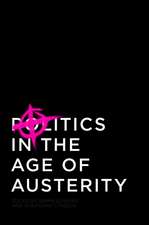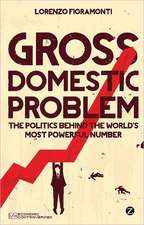The Political Economy of Bureaucracy: Routledge Frontiers of Political Economy
Autor Steven Richardsonen Limba Engleză Hardback – 8 noi 2010
Despite decades of intense study, serious reform efforts and impressive technological advances, the U.S. government remains a typical bureaucracy that fails to meet citizens’ expectations. Clearly, policy analysis is missing something. The problem may rest with "machine" models of government. Rules, especially those governing expenditures, are assumed to be feasible and effective. Analysis of the federal government as a complex system of relationships between semi-autonomous agents helps explain the disconnect between policy and results. The solution is to roll back micro-management of ends and means; policymakers should focus on objectives and facilitate implementation by selectively relaxing constraints that prevent experimentation needed to determine the most effective methods.
This book devotes unusual attention to the interaction between executive and legislative branches of government and between political appointees and career civil servants. Most studies of government policy take existing institutional structure for granted. Different conclusions emerge from this analysis by virtue of the systems view that accepts status quo hierarchies but questions the effectiveness of the rules that govern policy implementation. This book will be of interest to postgraduates and researchers focussing on Economic Theory, Public Choice, Institutional Economics and Political Science, as well as to those working in the public sector interested in Public Administration, Public Policy, and Organizational Behavior.
Din seria Routledge Frontiers of Political Economy
-
 Preț: 309.90 lei
Preț: 309.90 lei -
 Preț: 309.79 lei
Preț: 309.79 lei -
 Preț: 316.03 lei
Preț: 316.03 lei -
 Preț: 310.55 lei
Preț: 310.55 lei - 9%
 Preț: 866.82 lei
Preț: 866.82 lei -
 Preț: 311.87 lei
Preț: 311.87 lei -
 Preț: 311.61 lei
Preț: 311.61 lei -
 Preț: 286.99 lei
Preț: 286.99 lei -
 Preț: 327.83 lei
Preț: 327.83 lei -
 Preț: 386.12 lei
Preț: 386.12 lei - 9%
 Preț: 938.48 lei
Preț: 938.48 lei -
 Preț: 302.76 lei
Preț: 302.76 lei -
 Preț: 151.97 lei
Preț: 151.97 lei -
 Preț: 318.54 lei
Preț: 318.54 lei -
 Preț: 317.95 lei
Preț: 317.95 lei -
 Preț: 310.01 lei
Preț: 310.01 lei -
 Preț: 326.49 lei
Preț: 326.49 lei -
 Preț: 155.44 lei
Preț: 155.44 lei -
 Preț: 309.79 lei
Preț: 309.79 lei -
 Preț: 152.67 lei
Preț: 152.67 lei -
 Preț: 328.76 lei
Preț: 328.76 lei -
 Preț: 281.72 lei
Preț: 281.72 lei -
 Preț: 286.58 lei
Preț: 286.58 lei -
 Preț: 325.09 lei
Preț: 325.09 lei -
 Preț: 353.78 lei
Preț: 353.78 lei -
 Preț: 371.95 lei
Preț: 371.95 lei -
 Preț: 310.95 lei
Preț: 310.95 lei -
 Preț: 324.87 lei
Preț: 324.87 lei -
 Preț: 312.86 lei
Preț: 312.86 lei -
 Preț: 374.16 lei
Preț: 374.16 lei -
 Preț: 329.09 lei
Preț: 329.09 lei -
 Preț: 348.22 lei
Preț: 348.22 lei - 28%
 Preț: 1047.06 lei
Preț: 1047.06 lei - 18%
 Preț: 1169.45 lei
Preț: 1169.45 lei - 18%
 Preț: 1555.17 lei
Preț: 1555.17 lei - 18%
 Preț: 1048.43 lei
Preț: 1048.43 lei - 18%
 Preț: 1059.84 lei
Preț: 1059.84 lei - 31%
 Preț: 767.47 lei
Preț: 767.47 lei - 18%
 Preț: 731.92 lei
Preț: 731.92 lei - 26%
 Preț: 822.54 lei
Preț: 822.54 lei - 18%
 Preț: 1796.21 lei
Preț: 1796.21 lei - 26%
 Preț: 1184.91 lei
Preț: 1184.91 lei - 18%
 Preț: 1120.23 lei
Preț: 1120.23 lei - 15%
 Preț: 700.95 lei
Preț: 700.95 lei - 18%
 Preț: 1116.31 lei
Preț: 1116.31 lei - 22%
 Preț: 299.52 lei
Preț: 299.52 lei - 18%
 Preț: 999.46 lei
Preț: 999.46 lei
Preț: 525.44 lei
Preț vechi: 703.70 lei
-25% Nou
Puncte Express: 788
Preț estimativ în valută:
100.56€ • 104.59$ • 83.01£
100.56€ • 104.59$ • 83.01£
Carte tipărită la comandă
Livrare economică 12-26 aprilie
Preluare comenzi: 021 569.72.76
Specificații
ISBN-13: 9780415588560
ISBN-10: 0415588561
Pagini: 176
Ilustrații: 22 b/w images, 13 tables and 22 line drawings
Dimensiuni: 156 x 234 mm
Greutate: 0.49 kg
Ediția:1
Editura: Taylor & Francis
Colecția Routledge
Seria Routledge Frontiers of Political Economy
Locul publicării:Oxford, United Kingdom
ISBN-10: 0415588561
Pagini: 176
Ilustrații: 22 b/w images, 13 tables and 22 line drawings
Dimensiuni: 156 x 234 mm
Greutate: 0.49 kg
Ediția:1
Editura: Taylor & Francis
Colecția Routledge
Seria Routledge Frontiers of Political Economy
Locul publicării:Oxford, United Kingdom
Public țintă
Postgraduate and UndergraduateCuprins
Introduction 1. The Research Question 2. Bureaucracy and Beyond 3. Methodology and the Kaleidic Hyperstructure (KH) Model 4. From Politics as Usual to Transparency, Competition and Flexibility 5. Case Study of The Department of Homeland Security (DHS) 6. Lessons for Institutional Change
Notă biografică
Steve Richardson is a Program Specialist in the Department of Labor’s Center for Program Planning and Results, USA. He holds a Ph.D. in Economics from George Mason University.
Recenzii
"By replacing images of bureaus as machines, regardless of how well those machines might work, with images of bureaus as complex networks of relationships among interacting persons, Steve Richardson sets forth a menu of new directions for analytical examination. This imaginative and insightful treatment offers a feast to scholars interested in the political economy of bureaucracy."
Richard Wagner, George Mason University
Richard Wagner, George Mason University
Descriere
Richardson offers a careful analysis of US federal agencies examining the interaction between executive and legislative branches of government, combining Austrian economics, Public Choice and Evolutionary methodology in his approach.
















